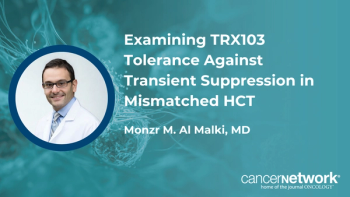
Phase 2 ENVASARC Trial of Envafolimab/Ipilimumab to Proceed for Undifferentiated Pleomorphic Sarcoma and Myxofibrosarcoma
After review by an independent data monitoring committee, the phase 2 ENVASARC trial, analyzing envafolimab monotherapy or in combination with ipilimumab for patients with undifferentiated pleomorphic sarcoma and myxofibrosarcoma, will proceed as planned.
An independent data monitoring committee has recommended that the phase 2 ENVASARC trial (NCT04480502), analyzing envafolimab plus or minus ipilimumab (Yervoy) for patients with undifferentiated pleomorphic sarcoma and myxofibrosarcoma, proceed as intended, according to a press release from TRACON Pharmaceuticals.1
The trial was paused to review 12-week safety data that included patients who enrolled on the study as of June 2022. The committee looked at data from 10 patients who were enrolled on cohort C, and 10 patients in cohort D. In cohort C, patients were treated with envafolimab, a single-domain antibody designed against PD-L1, subcutaneously at 600 mg every 3 weeks. In cohort D, patients received a matched dosing of envafolimab plus 1 mg/kg of ipilimumab every 3 weeks for 4 doses.
“Envafolimab at the 600 mg dose has been well tolerated as a single agent and when combined with [ipilimumab] in refractory sarcoma patients who are enrolled in the ENVASARC trial. Accrual continues to exceed projections and we remain on track for the Independent Data Monitoring Committee to review interim efficacy data in the fourth quarter of this year,” James Freddo, MD, TRACON’s chief medical officer, said in the press release.
The trial has an estimated enrollment of 230 patients. In addition to cohorts C and D, those in cohort A received envafolimab at 300 mg every 3 weeks, and in cohort B, patients received matched envafolimab plus ipilimumab at 1mg/kg every 3 weeks for 4 doses. The primary end point is objective response rate by RECIST 1.1 criteria and assessed by blinded independent central review. The key secondary end points include duration of response, disease control rate, progression-free survival, and overall survival.
Patients were eligible for treatment if they had histologically confirmed locally advanced or metastatic disease, documented progression following chemotherapy, and at least 1 measurable lesion. Patients were also allowed to enroll on the trial if they had an ECOG performance status of 0 or 1 and adequate hematologic and organ function.
Exclusion criteria included having more than 2 prior lines of therapy for the indicated disease, immune checkpoint inhibitor, or immunomodulatory therapy. Having an active autoimmune disease that requiring systemic treatment is also grounds for exclusion. Additionally, patients are required to have not undergone major surgery within 4 weeks of dosing with the investigational agent, or have an active additional malignancy, central nervous system metastases, and/or carcinomatous meningitis. If patients had interstitial lung disease, are unwilling to apply highly effective contraception during the study, or have other severe or uncontrolled conditions, they will be excluded from the study.
In November 2021, envafolimab was approved by the Chinese National Medical Products Administration for patients with microsatellite instability-high or deficient mismatch repair advanced solid tumors.2 Additionally, the FDA has granted fast track designation to envafolimab for patients with unresectable or metastatic undifferentiated pleomorphic sarcoma and myxofibrosarcoma who have received 2 prior lines of chemotherapy.3
References
- TRACON Pharmaceuticals announces results of independent data monitoring committee review of 12 week safety data from ENVASARC phase 2 pivotal trial - trial to proceed as planned. News Release. TRACON. October 6, 2022. Accessed October 7, 2022. https://yhoo.it/3RJSgzW
- TRACON Pharmaceuticals reports regulatory approval of envafolimab in China. News Release. TRACON. November 29, 2021. Accessed October 7, 2022. https://bit.ly/3CfAkri
- TRACON Pharmaceuticals announces fast track designation by the FDA for envafolimab for the treatment of the soft tissue sarcoma subtypes of UPS and MFS. News Release. TRACON. September 14, 2022. Accessed October 7, 2022. https://bit.ly/3CigAmO
Newsletter
Stay up to date on recent advances in the multidisciplinary approach to cancer.










































